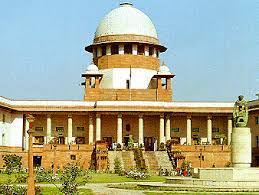Notice was issued to the Registrars General of all the High Courts, the National Company Law Appellate Tribunal,[NCLAT] the National Consumer Disputes Redressal Commission,[ NCDRC] and the National Green Tribunal.[ NGT] They were directed to file an affidavit detailing (i) how many video conferencing hearings have taken place in the last three months; and (ii) whether any courts are declining to permit video conferencing hearings. (Para 1)
During the course of the hearing, it has also emerged that whereas several High Courts do have facilities for video conferencing, very few High Courts are operating through the hybrid mode of hearing. The infrastructure which is required for conducting hybrid hearings may be of a different order as compared to the infrastructure for video conferencing. (Para 12)
In this backdrop, we issue the following directions:
(i) After a lapse of two weeks from the date of this order, no High Court shall deny access to video conferencing facilities or hearing through the hybrid mode to any member of the Bar or litigant desirous of availing of such a facility;
(ii) All State Governments shall provide necessary funds to the High Courts to put into place the facilities requisite for that purpose within the time frame indicated above;
(iii) The High Courts shall ensure that adequate internet facilities, including Wi-Fi facilities, with sufficient bandwidth are made available free of charge to all advocates and litigants appearing before the High Courts within the precincts of the High Court complex;
(iv) The links available for accessing video conferencing/hybrid hearings shall be made available in the daily cause-list of each court and there shall be no requirement of making prior applications. No High Court shall impose an age requirement or any other arbitrary criteria for availing of virtual/hybrid hearings;
(v) All the High Courts shall put into place an SOP within a period of four weeks for availing of access to hybrid/video conference hearings. In order to effectuate this, Justice Rajiv Shakdher, Hon’ble Judge of the High Court of Delhi is requested to prepare a model SOP, in conjunction with Mr Gaurav Agrawal and Mr K Parameshwar, based on the SOP which has been prepared by the e-Committee. Once the SOP is prepared, it shall be placed on the record of these proceedings and be circulated in advance to all the High Courts so that a uniform SOP is adopted across all the High Courts for facilitating video conference/hybrid hearings;
(vi) All the High Courts shall, on or before the next date of listing, place on the record the following details:
(a) The number of video conferencing licences which have been obtained by the High Court and the nature of the hybrid infrastructure;
(b) A court-wise tabulation of the number of video conference/hybrid hearings which have taken place since 1 April 2023; and
(c) The steps which have been taken to ensure that Wi-Fi/internet facilities are made available within every High Court to members of the Bar and litigants appearing in person in compliance with the above directions.
(vii) The Union Ministry of Electronics & Information Technology is directed to coordinate with the Department of Justice to ensure that adequate bandwidth and internet connectivity is provided to all the courts in the North-East and in Uttarakhand, Himachal Pradesh and Jammu and Kashmir so as to facilitate access to online hearings;
(viii) All High Courts shall ensure that adequate training facilities are made available to the members of the Bar and Bench so as to enable all practising advocates and Judges of each High Court to be conversant with the use of technology. Such training facilities shall be set up by all the High Courts under intimation to this Court within a period of two weeks from the date of this order; and
(ix) The Union of India shall ensure that on or before 15 November 2023, all tribunals are provided with requisite infrastructure for hybrid hearings. All Tribunals shall ensure the commencement of hybrid hearings no later than 15 November 2023. The directions governing the High Courts shall also apply to the Tribunals functioning under all the Ministries of the Union Government including CESTAT, ITAT, NCLAT, NCLT, AFT, NCDRC, NGT, SAT, CAT, DRATs and DRTs. (Para 14)
The use of technology by the Bar and the Bench is no longer an option but a necessity. Members of the Bench, the Bar and the litigants must aid each other to create a technologically adept and friendly environment. The above directions must be implemented by all concerned stakeholders in letter and in spirit. (Para 17)
SUPREME COURT OF INDIA
2023 STPL(Web) 328 SC
[2023 INSC 891]
Sarvesh Mathur Vs. Registrar General High Court Of Punjab And Haryana
Writ Petition (Criminal) No 351 of 2023-Decided on 6-10-2023
https://stpllaw.in/wp-content/uploads/2023/10/2023-STPLWeb-328-SC.pdf







